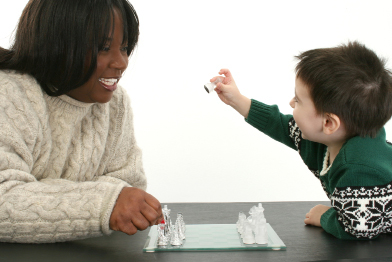Session 3
1. Session 3
1.7. Inquiry 3
Session 3: Child Abuse, Family Violence, and Community Resources
Inquiry 3: How Do You Care for the Child?
Caregiver’s Role in Providing Care for Children Who Have Been Abused

© Jaimie Duplass/176314/Fotolia
A child who has been abused may have low self-esteem, may be easily frightened, and may have very little confidence in the world around him or her.
The child needs extra time and extra care. Here are some important tips for providing care to a child who has been abused:
- Ensure that a child has a secure and meaningful relationship with the caregiver.
- Listen carefully to the child if she or he tells you about abuse. Don’t ask questions, just listen—and give your full attention.
- Let the child know that you believe him or her and reassure her that it was okay to tell you.
- Do not make promises to the child; for example, “I will keep your secret.”
- Remain in control of your emotions and acknowledge the child’s feelings without overreacting to the situation.
- Involve the supervisor immediately. Report the abuse without delay. If you need support from friends or colleagues, do it in a way that does not give away confidential information, such as the name of child and/or family.
- Document the situation carefully.
When you are interacting with the child, remember to do the following:
- Put limits on behaviour—accept the feelings, but not unacceptable behaviour; for example, “I know you are mad, but I can’t let you hit Sally.”
- Get on the child’s eye level and speak directly to them in a quiet voice. Use praise whenever possible.
- Encourage the child to stand up to others and resolve conflicts (if he or she is old enough).
- Provide for lots of active play—running, jumping, and hopping help children feel in control of their bodies.
- Avoid competitive activities, if possible.
- Water play and playdough seem to have an especially soothing effect on children. Make these activities available on a regular basis.
- Always end the day with a comment on a positive action.
- Do not overcompensate. Being allowed to break the rules and guidelines of the centre will only confuse the child.
- Ensure that the child has opportunities for success and to be involved in activities with which he or she is comfortable.
- Give the child time and space. Be careful about physical contact like hugs. Let the child set his or her own pace in establishing physical contact.
- Invite—don’t force—the child to join activities.
Before moving on to Learning Activity 3, take some time to view the “Child Abuse” slide show. It provides a good summary of the information covered in the three inquiries, as well as offering situations to reflect on.
How Do You Talk To a Child?
If a child discloses abuse to you, do not probe for details. Listen to the information provided and record it as soon as possible in the child’s own words. Be supportive and let the child know it is right to tell someone.
Here are some suggestions for talking to a child about abuse. It is important to be a good listener and avoid probing the child for information.
|
Do:
|
Don’t:
|
Alberta Children’s Services, “Protocols for Handling Child Abuse and Neglect In Child Care Services” (May 2000). 5, <www.calgaryandareacfsa.gov.ab.ca/home/documents/AdditionalResources/DC_Inv_Protocol.pdf>; (accessed March 2010). Reproduced with permission.
Role of the Caregiver in Responding to Adults Who May Have Abused a Child
A caregiver may suspect that a co-worker or family member has abused a child. Caregivers can act in a warm, supportive way. Asking a question such as “Is there something troubling you?” shows concern. Also, it may encourage the other adult to confide in you.
An adult family member may tell a caregiver that she or he is in an abusive situation. If that should occur, caregivers should
- respond in the same calm, caring way as they would to a child
- help the family member find the appropriate community resources
- watch the child in that family for any changes in behaviour
Recognize that dealing with child abuse is emotionally very difficult. Ensure that you have the support you need. Use the crises phone line or a community agency that provides counselling. Bear in mind that you yourself may need support when you are trying to help a child. With issues as important as abuse, there are many resources available to those who care to become involved. Asking for help will not diminish your role as a caregiver and can positively help you to deal with circumstances such as these.